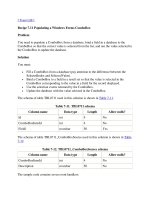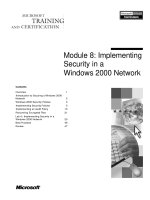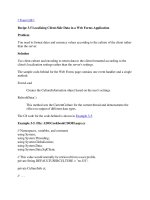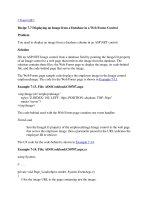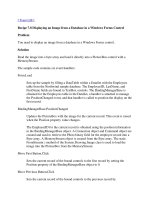Displaying an Image from a Database in a Windows Forms Control
Bạn đang xem bản rút gọn của tài liệu. Xem và tải ngay bản đầy đủ của tài liệu tại đây (26.44 KB, 5 trang )
[ Team LiB ]
Recipe 7.8 Displaying an Image from a Database in a Windows Forms Control
Problem
You need to display an image from a database in a Windows Forms control.
Solution
Read the image into a byte array and load it directly into a PictureBox control with a
MemoryStream.
The sample code contains six event handlers:
Form.Load
Sets up the sample by filling a DataTable within a DataSet with the Employees
table from the Northwind sample database. The EmployeeID, LastName, and
FirstName fields are bound to TextBox controls. The BindingManagerBase is
obtained for the Employees table in the DataSet, a handler is attached to manage
the PositionChanged event, and that handler is called to position the display on the
first record.
BindingManagerBase.PositionChanged
Updates the PictureBox with the image for the current record. This event is raised
when the Position property value changes.
The EmployeeID for the current record is obtained using the position information
in the BindingManagerBase object. A Connection object and Command object are
created and used to retrieve the Photo binary field for the employee record into a
Byte array. A MemoryStream object is created from the Byte array. The static
FromStream( ) method of the System.Drawing.Image class is used to load the
image into the PictureBox from the MemoryStream.
Move First Button.Click
Sets the current record of the bound controls to the first record by setting the
Position property of the BindingManagerBase object to 0.
Move Previous Button.Click
Sets the current record of the bound controls to the previous record by
decrementing the Position property of the BindingManagerBase object by 1.
Move Next Button.Click
Sets the current record of the bound controls to the next record by incrementing
the Position property of the BindingManagerBase object by 1.
Move Last Button.Click
Sets the current record of the bound controls to the last record by setting the
Position property of the BindingManagerBase object to the total number of
records, as returned by the Count property, minus 1.
The C# code is shown in Example 7-16
.
Example 7-16. File: DisplayDatabaseImageForm.cs
// Namespaces, variables, and constants
using System;
using System.Configuration;
using System.Drawing;
using System.Windows.Forms;
using System.IO;
using System.Data;
using System.Data.SqlClient;
private DataSet ds;
private SqlDataAdapter da;
private BindingManagerBase bm;
// . . .
private void DisplayDatabaseImageForm_Load(object sender,
System.EventArgs e)
{
// Create the DataSet.
ds = new DataSet( );
// Create the DataAdapter and retrieve the Employees table.
String selectCommand =
"SELECT EmployeeID, LastName, FirstName FROM Employees";
da = new SqlDataAdapter(selectCommand,
ConfigurationSettings.AppSettings["Sql_ConnectString"]);
da.FillSchema(ds, SchemaType.Source, "Employees");
da.Fill(ds, "Employees");
// Bind several table fields to controls.
employeeIdTextBox.DataBindings.Add("Text", ds,
"Employees.EmployeeID");
lastNameTextBox.DataBindings.Add("Text", ds, "Employees.LastName");
firstNameTextBox.DataBindings.Add("Text", ds, "Employees.FirstName");
// Get the binding manager base for the Employees table.
bm = BindingContext[ds, "Employees"];
// Update the image in response to each record reposition.
bm.PositionChanged += new EventHandler(bm_PositionChanged);
// Update the display for the first record.
bm_PositionChanged(null, null);
}
private void bm_PositionChanged(Object sender, EventArgs e)
{
// Refresh the photo displayed when the current record changes.
// Get the new EmployeeID using the BindingManager.
int employeeId =
(int)ds.Tables["Employees"].Rows[bm.Position]["EmployeeID"];
// Create a connection.
SqlConnection conn = new SqlConnection(
ConfigurationSettings.AppSettings["Sql_ConnectString"]);
// Create a command to retrieve the employee photo.
String sqlText = "SELECT Photo FROM Employees WHERE EmployeeID=" +
employeeId;
SqlCommand cmd = new SqlCommand(sqlText, conn);
// Retrieve the employee photo to a stream.
conn.Open( );
Byte[] image = (Byte[])cmd.ExecuteScalar( );;
MemoryStream ms = new MemoryStream(image);
conn.Close( );
// Load the image into the PictureBox from the stream.
photoPictureBox.Image = Image.FromStream(ms);
ms.Close( );
}
private void moveFirstButton_Click(object sender, System.EventArgs e)
{
bm.Position = 0;
}
private void movePreviousButton_Click(object sender, System.EventArgs e)
{
bm.Position -= 1;
}
private void moveNextButton_Click(object sender, System.EventArgs e)
{
bm.Position += 1;
}
private void moveLastButton_Click(object sender, System.EventArgs e)
{
bm.Position = bm.Count - 1;
Discussion
The Windows Forms PictureBox control displays bitmap, JPEG, metafile, or icon
images.
In the solution, the image stored as a BLOB in the database is retrieved into a Byte array,
which is in turn copied into a System.IO.MemoryStream object. The static FromStream( )
method of the Image class creates an Image object that is loaded into the PictureBox.
This example uses the modified version of Northwind, where the
Photo field has been updated for all employees to remove the OLE
image header. For more information, see the online sample code.
Binding Windows Forms Controls
The abstract BindingManagerBase class synchronizes all Windows Forms
controls (i.e., Binding objects) that are bound to the same data source so that
they display information from the object within the data source, such as a row
in a DataTable.
The BindingContext class is used to instantiate a BindingManagerBase object
and either a CurrencyManager or PropertyManager object is returned
depending on the type of data source:
•
The CurrencyManager class inherits from the BindingManagerBase
class and maintains a pointer for the current item in a data source that
implements IList, IListSource, or IBindingList. Data sources do not
necessarily support a current-item pointer. The CurrencyManager
notifies all data-bound controls if the current item changes so that they
can refresh their data.
•
The PropertyManager class inherits from the BindingManagerBase class
and maintains the current property of an object, rather than an object in a
list.
The Position property is a zero-based index that gets or sets the current position
in the underlying data source list. The Count property returns the number of
items in the list. The Current property returns the current object in the list,
which must be cast to the type of object in the underlying data source before it
can be used.
[ Team LiB ]




